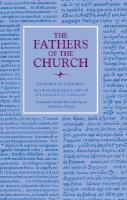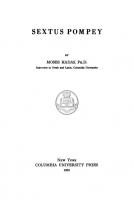Plutarch's Lives: Agesilaus and Pompey. Pelopidas and Marcellus [5] 9780674990975, 0674990978
Plutarch (Plutarchus), ca. 45–120 CE, was born at Chaeronea in Boeotia in central Greece, studied philosophy at Athens,
227 9 21MB
English Pages 572 Year 1955
Recommend Papers
![Plutarch's Lives: Agesilaus and Pompey. Pelopidas and Marcellus [5]
9780674990975, 0674990978](https://ebin.pub/img/200x200/plutarchs-lives-agesilaus-and-pompey-pelopidas-and-marcellus-5-9780674990975-0674990978.jpg)
- Author / Uploaded
- Bernadotte Perrin (trans.)
File loading please wait...
Citation preview
I
I
I
THE LOEB CLASSICAL LIBRARY FOUNDED BY JAMES LOEB,
LL.D.
EDITED BY fT. E, PAGE, tE. CAPPS, L, A.
POST,
M.A.
E. H.
C.H., LITT.D.
tW.
PH.D., LL.D.
H. D.
WARMINGTON,
ROUSE,
PLUTARCH'S LIVES V
litt.d.
m.a., f.r.hist.soo.
PLUTAKCH'S LIVES WITH AN ENGLISH TRANSLATION BY
BERNADOTTE PERRIN IN ELEVEN VOLUMES
V AfiESILAUS
AND POMPEY
PELOPIDAS AND MARCELLUS
CAMBRIDGE, MASSACHUSETTS
HARVARD UNIVERSITY PRESS LONDON
WILLIAM HEINEMANN LTD MCMLV
First printed 1917
Reprinted 1955
Printed in Great Britain
CONTENTS PAOE
PREFATORY NOTE
ORDER OF THE PARALLEL LIVES
vi
IN THIS EDITION
TRADITIONAL ORDER OF THE PARALLEL LIVES AOESILAU8
.
.
....
.
viii
ix
1
POMPET
115
COMPARISON OF AGESILAUS AND POMPEY
326
PELOPIDA8
339
MARCELLUS
435
COMPARISON OF PKL0PIDA3 AND MARCBLLUS
522
DICTIONARY OF PROPER NAMES
633
PREFATORY NOTE As in the preceding volumes of this series, agreement between the Sintenis (Teubner, 1873-1875) and Bekker (Tauchnitz, 1855-1857) editions of the Parallel Lives has been taken as the basis for the text. Any preference of one to the other, and any An departure from both, have been indicated. abridged account of the manuscripts of Plutarch may be found in the Introduction to the first
Of the
volume.
Lives presented in this volume, the
Agesilaiis and Pompey are contained in the Codex Sangermanensis (S^) and the Codex Seitenstettensis (S), and in a few instances weight has been given
to readings
from
Codex Matritensis (M*), on
the
the authority of the collations of Charles Graux, as published
in
Bursians
Jnhreshericht
(1884).
No
attempt has been made, naturally, to furnish either a diplomatic text or a full critical apparatus. For these, the reader
must
still
be referred to the major
edition of Sintenis (Leipzig, 1839-1846, 4 voll., 8vo). The reading which follows the colon in the critical
notes vi
is
that of the
Teubner
Sintenis,
and
also, unless
PREFATORY NOTE otherwise stated
in
the
note,
of
the
Tauchnitz
Bekker. All the standard translations of the
been carefully compared and
Lives have
utilized, including that
of the Pompey by Professor Long. B.
PERRIN.
New Havbn,
Connioticut, U.S.A. March, 1917.
vu
ORDER OF THE PARALLEL LIVES IN THIS EDITION IN THE CHRONOLOGICAL SEQUENCE OF THE GREEK LIVES. Volume z^' \
(1)
[^
(2)
(3)
Volume (4)
Volume
I.
Theseus and Romulua. Comparison. Lycurgus and Numa. Comparison. Solon and Publicola. Comparison.
(22) (7)
Paulus.
Comparison.
Volume
Demosthenes and Cicero.
(17)
Comparison. Alexander and Julius Caesar.
Caraillus.
(9)
Aristides and Cato the Elder.
Comparison. (13)
Cimon and
Volume Pericles
(18)
III.
(21)
Comparison. Nicias and Crassus.
Comparison.
Volume (6)
Alcibiades and Coriolanus.
Lysander and
Sulla.
Comparison.
Volume (16) Agesilaiis (8)
(11)
V.
and Pompey.
Comparison. Pelopidas and Marcellus. Comparison.
IX.
Demetrius and Antony. Comparison. PyrrhusandCaiusMarius.
Volume IV.
Comparison. (12)
VIII.
and Eumenes. Comparison. Phocion and Cato the Younger.
Volume
and Fabius Max-
im us. (14)
Volume (15) Sertorius
Lucullus.
Comparison.
(5)
VII.
(20) II.
Themistocles and
VI.
Dion and Brutus. Comparison. Timoleon and Aemilius
X.
THE TRADITIONAL ORDER OF THE PARALLEL LIVES. (1)
Theseus and Romulus.
(2)
Lycurgus and Numa.
(3)
Solon and Publicnla.
(4)
Themistocles and Camillus.
and Fabius Maxiinua.
(5)
Pericles
(6)
Alcibiades and Coriolanus.
(7)
Timoleon and Aemilius Paulas.
(8)
Pelopidas and Marcellus.
(9)
Aristides and Cato the Elder.
(10) (11)
Philopoemen and Flamininus. Pyrrhus and Caius Marius.
(12)
Lysander and
(18)
Cimon and LucuUus.
(14)
Niciaa and Crassus.
(15) Sertorius
Sulla.
and Eumenes.
(17)
and Pompey. Alexander and Julius Caesar.
(18)
Phocion and Calo
(16) Age.silaus
(19)
tlie Younger. and Caius Agis and Cleomenes, and Tiberius Gracchus.
(20)
Demosthenes and
(21)
Demetrius and Antony.
(22)
Dion and Brutus.
Cicero.
(24) Aratus.
(23) Artaxerxes. (25)
Galba.
(26)
Otho.
IX
AGESILAUS
ArH2IAA02 ^-
'-A/JXtSa/Ao? o Zev^tSd/iou ^a(Ti\evcra
![Plutarch, Lives: Agesilaus and Pompey. Pelopidas and Marcellus [5]](https://ebin.pub/img/200x200/plutarch-lives-agesilaus-and-pompey-pelopidas-and-marcellus-5.jpg)








